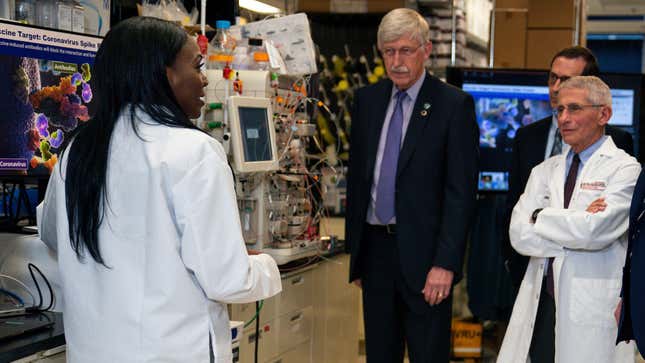
With skepticism about the safety and efficacy of a COVID-19 vaccine running high among African Americans, Dr. Anthony Fauci, the nation’s leading infectious disease expert, wants Black people to know that a Black woman, Dr. Kizzmekia Corbett, was heavily involved in developing one of the vaccines that will soon be available to Americans later this month.
Fauci, speaking at a National Urban League event on Tuesday, acknowledged the history behind African American distrust of medical research and the American health care system, reports CNN. But the epidemiologist also emphasized that the two forthcoming coronavirus vaccines are both safe and effective, drawing attention to Dr. Corbett’s involvement in the process.
“The very vaccine that’s one of the two that has absolutely exquisite levels—94 to 95 percent efficacy against clinical disease and almost 100 percent efficacy against serious disease that are shown to be clearly safe—that vaccine was actually developed in my institute’s vaccine research center by a team of scientists led by Dr. Barney Graham and his close colleague, Dr. Kizzmekia Corbett, or Kizzy Corbett,” Fauci said.
“So, the first thing you might want to say to my African American brothers and sisters is that the vaccine that you’re going to be taking was developed by an African American woman,” he continued. “And that is just a fact.”
The vaccine Fauci is referring to is the one that will be released by Moderna, one of two vaccines that the U.S. Food and Drug Administration is expected to give emergency use authorization to (the other will be distributed by Pfizer). Dr. Corbett, the lead scientist for the National Institute of Health’s coronavirus vaccine research, has spoken out about institutional distrust in the Black community in the past, saying she’s seen the hesitancy to take vaccines first-hand.
“I would say to people who are vaccine-hesitant that you’ve earned the right to ask the questions that you have around these vaccines and this vaccine development process,” Corbett told the CNN podcast “Coronavirus: Fact vs. Fiction.”
This hesitancy is well-documented and rooted in a painful history. One recent study found just 14 percent of Black people trust that a vaccine will be safe, and only 18 percent believed it would effectively protect them from COVID-19.
Distrust in a vaccine was also linked to a broader distrust in the government at large, as well as knowledge of the Tuskegee syphilis study, in which African American men were unknowingly studied for the venereal disease—and not given treatment for it. Two out of every three Black respondents in the same study said the government could never or could only rarely be trusted to look after their interests.
This is concerning for public health experts, who note that the success of these vaccines is contingent on having enough Americans take them.
Black Americans, in particular, have been especially vulnerable to developing the most severe symptoms of COVID-19, for reasons that are largely systemic. For the last several months, Black physicians have been reaching out to their communities to educate and encourage people to take a vaccine once it becomes available.
“Trust, especially when it has been stripped from people, has to be rebuilt in a brick-by-brick fashion,” Dr. Corbett said. “And so, what I say to people firstly is that I empathize, and then secondly is that I’m going to do my part in laying those bricks. And I think that if everyone on our side, as physicians and scientists, went about it that way, then the trust would start to be rebuilt.”